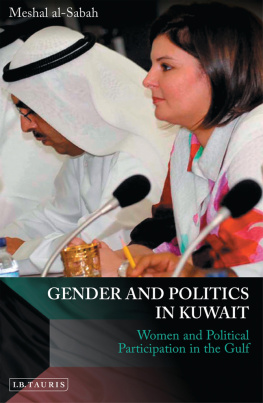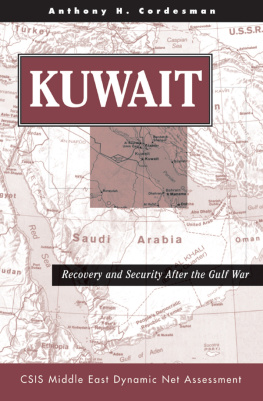First published in 1980 by Kegan Paul International Ltd
This edition first published in 2018
by Routledge
2 Park Square, Milton Park, Abingdon, Oxon OX14 4RN
and by Routledge
711 Third Avenue, New York, NY 10017
Routledge is an imprint of the Taylor & Francis Group, an informa business
1980 Y. S. F. Al-Sabah
All rights reserved. No part of this book may be reprinted or reproduced or utilised in any form or by any electronic, mechanical, or other means, now known or hereafter invented, including photocopying and recording, or in any information storage or retrieval system, without permission in writing from the publishers.
Trademark notice: Product or corporate names may be trademarks or registered trademarks, and are used only for identification and explanation without intent to infringe.
British Library Cataloguing in Publication Data
A catalogue record for this book is available from the British Library
ISBN: 978-1-138-62956-1 (Set)
ISBN: 978-1-315-15946-1 (Set) (ebk)
ISBN: 978-1-138-06083-8 (Volume 6) (hbk)
ISBN: 978-1-315-16001-6 (Volume 6) (ebk)
Publisher's Note
The publisher has gone to great lengths to ensure the quality of this reprint but points out that some imperfections in the original copies may be apparent.
Disclaimer
The publisher has made every effort to trace copyright holders and would welcome correspondence from those they have been unable to trace.
The Oil Economy of Kuwait
Dr Y. S. F. Al-Sabah
Kegan Paul International Ltd
London and Boston
First published in 1980
by Kegan Paul International Ltd
39 Store Street,
London WC1E 7DD and
9 Park Street,
Boston, Mass. 02108, USA
Set in Press Roman by
Hope Services
Abingdon, Oxon
and printed in Great Britain by
Redwood Burn Ltd
Trowbridge & Esher
Y. S. F. Al-Sabah 1980
No part of this book may be reproduced in
any form without permission from the
publisher, except for the quotation of brief
passages in criticism
ISBN 0 7103 0003 4
The idea behind the writing of this book is not new. However, the fact that it was actually written was the result of continuous encouragement and insistence of many friends, both in the academic and business communities of the Arab and western worlds. The research behind the writing of this book has covered a long period, often interrupted by personal assignments and commitments throughout the world. However, it was not conducted under the auspices of any organization, either foreign or domestic, and the author accepts responsibility for the views contained within.
Y. S. F. Al-Sabah
Kuwait has little recorded ancient history. Recent excavation on Failaka Island, however, indicates Greek settlement around 600 BC and probably it was also a stopping point for the other old civilizations of Mesopotamia, whose influence spread to other parts of the Ancient World through their sea-going culture. Contemporary studies have shown that the Babylonians and the Sumerians crossed the Gulf and the Indian Ocean using their famous reed boats perhaps if more excavation were carried out on Failaka and the other islands off Kuwait, traces of some of the old Mesopotamian civilizations would be discovered. Indeed, until recently, some of the Kuwaiti fishermen used small reed boats called warjiah, which they built themselves from reed imported from southern Iraq and in a way similar to the Sumerian ones. Also, the Kuwaitis used water jars and reed plates for their domestic purposes, and these again were similar to vessels used by the Sumerians. Nevertheless, none of the present characteristics of Kuwait and its people has any connection with the countrys ancient history.
With the advent of Islam and the increasing influence of the Arabs beyond the Arabian Peninsula some parts of the northern territory of Kuwait, in particular Kathma, became the battleground of the Moslem Arabs and the Persians. The former won a decisive battle under their famous leader Khalid Ibn Al-Waleed. The effects of that victory were far reaching, bringing about the conversion of the Persians to Islam -the influence of which was felt as far east as China. It was this Islamic-Arabic culture that became the main feature of Kuwait and that was carried by the tribes migrating from the heart of the Arab Peninsula.
There is no richness or diversity in the geography of Kuwait - the predominant factors are the desert and the sea, which have formed and shaped human occupation and organization. The challenge of the environment to the inhabitants of Kuwait was harsh and unrelenting. The hostility of the desert to all kinds of human adaptation made the building of a civilized permanent community an impossible task. The lack of running water was the main factor underlying the nomadic way of life. Scarcity of all kinds made tribal wars the rule rather than the exception. Those writers who romanticize life in the desert do not really know it and only those who have lived in it understand it.
Nevertheless, the geographical location of Kuwait made it an ideal outlet for much of the hinterland of the Arabian Peninsula and it became an important commercial centre for the desert caravans, carrying various goods from Kuwait to Europe through Aleppo and other ports. Similarly, the sea routes carried the Iraqi goods to East Africa and India and the latter sent their trade to the Gulf ports and in particular to Kuwait as a commercial centre and transit town.
It was Kuwaits geographical position in relation to the major trade routes that gave it such political significance in the eyes of the major powers. The British were aware of the importance of Kuwaits location and its relation to their trade route to India and the Far East. The Germans were even more conscious of this, and their only way to challenge Britain seemed to be to gain access to Kuwait and thus to India and the Far East. Consequently, they planned their railway system to Anathol in Turkey to be linked to Baghdad, Basra and Kuwait. The Russians, too, were interested in Kuwait and the Gulf region once again for the access provided to India and the Far East. Among several railway plans made by the Russians was the project to connect Tripoli on the Eastern coast of the Mediterranean with Kuwait. At the same time, several Russian ships and missions visited Kuwait, the main purpose being to undermine the influence of Britain in Kuwait and the Gulf region as a whole and to replace the nominal power of Turkey in that part of the world.
Although British politicians and diplomats remained undecided about their position in Kuwait certain events indicating the active interest of other foreign powers accelerated a clarification of the British position. This began when Shaikh Mubarak Al-Sabah came to power in 1896. He wished to secure British protection against Ottoman threats and, although Britain remained initially reluctant to extend its full legal protection to him, by the year 1899 it had realized beyond doubt the importance of Kuwait and of Shaikh Mubarak Al-Sabah and a treaty of protection was signed.








